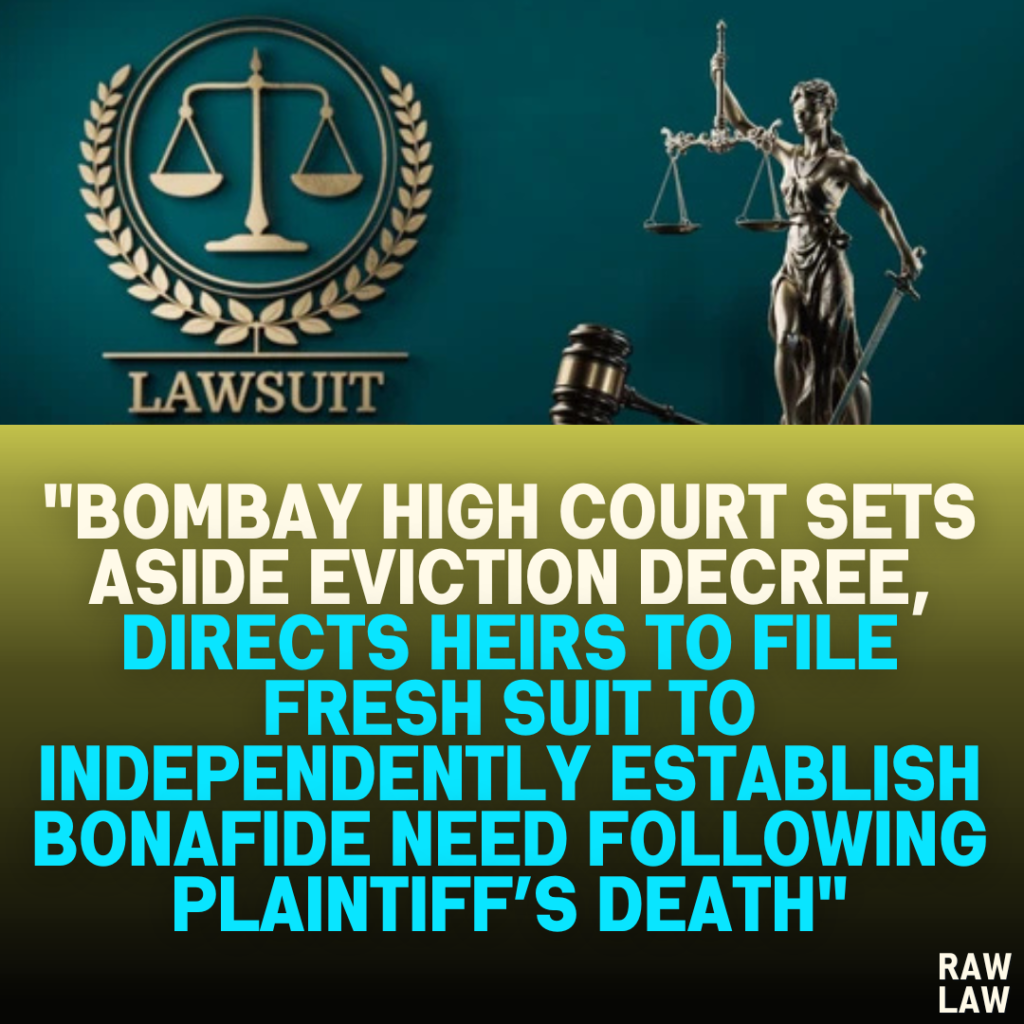Court’s Decision
The Bombay High Court, in exercising its revisionary jurisdiction, set aside the Appellate Bench of Small Causes Court’s eviction decree. The court upheld the Trial Court’s dismissal of the suit, emphasizing the necessity for legal heirs to establish their own bonafide requirement if they seek recovery of possession following the death of the original plaintiff and his son. The court concluded that, without such pleadings, the heirs lacked entitlement to possession based on the initial bonafide requirement claimed by the deceased parties.
Facts
The case revolves around the tenancy dispute over Shop No. 13 in Miranda Chawl, Mumbai, occupied by the defendant as a deemed tenant after a declaratory suit judgment in 1980. Originally, the plaintiff, who claimed tenancy rights from Shiv Sena Trust, sought eviction on the grounds of bonafide requirement to conduct a cycle repair business. The defendant resisted, citing occupancy rights and a lack of bonafide requirement from the plaintiff’s side.
Following the Trial Court’s dismissal of the eviction suit in 2013, the plaintiff’s son filed an appeal but subsequently passed away. The son’s heirs continued the appeal without amending the pleadings to reflect their own need for the premises.
Issues
- Whether the plaintiff’s heirs can maintain an eviction suit on the ground of bonafide requirement based on the deceased plaintiff’s pleadings.
- Whether the need for possession due to bonafide requirement survives the death of the original plaintiff and his son.
Petitioner’s Arguments
The petitioner (defendant) argued that the Appellate Bench’s decree, which revived the eviction order, erroneously upheld the ground of bonafide requirement despite the death of the original plaintiff and his son. They contended that the heirs had not demonstrated an independent bonafide need, as the initial need pleaded by the deceased plaintiff ceased to exist.
Respondent’s Arguments
The respondents (heirs of the deceased plaintiff) claimed that the bonafide requirement subsisted despite the plaintiff’s death. They argued that the necessity for the premises persisted, and the heirs were entitled to possession for personal and family use. They relied on precedents affirming that the requirement should be assessed as of the filing date, thus preserving their right to eviction based on the initial claim.
Analysis of the Law
The court scrutinized previous decisions, including Kamaleshwar Prasad v. Pradumanju Agrawal and Gaya Prasad v. Prdeep Shrivastava, which emphasized that subsequent developments must significantly impact the original need for it to be deemed extinguished. In Sheshambal v. Chelur Corporation, the Supreme Court clarified that the need must be specific and pleaded by surviving heirs if the original plaintiff dies.
Precedent Analysis
The court examined relevant precedents, noting that in cases like Sheshambal and Yashodabai Gopalrao Khedkar, subsequent claims by heirs must be independently established through specific pleadings of bonafide requirement.
Court’s Reasoning
The High Court found that neither the plaintiff’s widow nor his heirs had made any amendments to reflect a personal or family need after the plaintiff’s death. The court highlighted that merely continuing the suit based on the deceased plaintiff’s requirements did not suffice, and specific pleadings on behalf of the heirs were essential. The court noted that the Appellate Court’s oversight of this issue constituted a jurisdictional error.
Conclusion
The High Court set aside the Appellate Bench’s decree, reinstating the Trial Court’s dismissal of the suit. The court clarified that the heirs could file a fresh suit articulating their bonafide need if they sought possession.
Implications
This decision reaffirms the principle that successors in possession cases must explicitly plead their bonafide requirement to sustain an eviction suit. It underscores the need for a clear legal basis from heirs when pursuing tenancy disputes after the death of the original litigants.




Pingback: Delhi High Court Dismisses Petition for Sub Inspector Exam Participation Due to Failure to Check Website Updates: "Petitioner Was Bound to Check the Website on a Regular Basis" - Raw Law